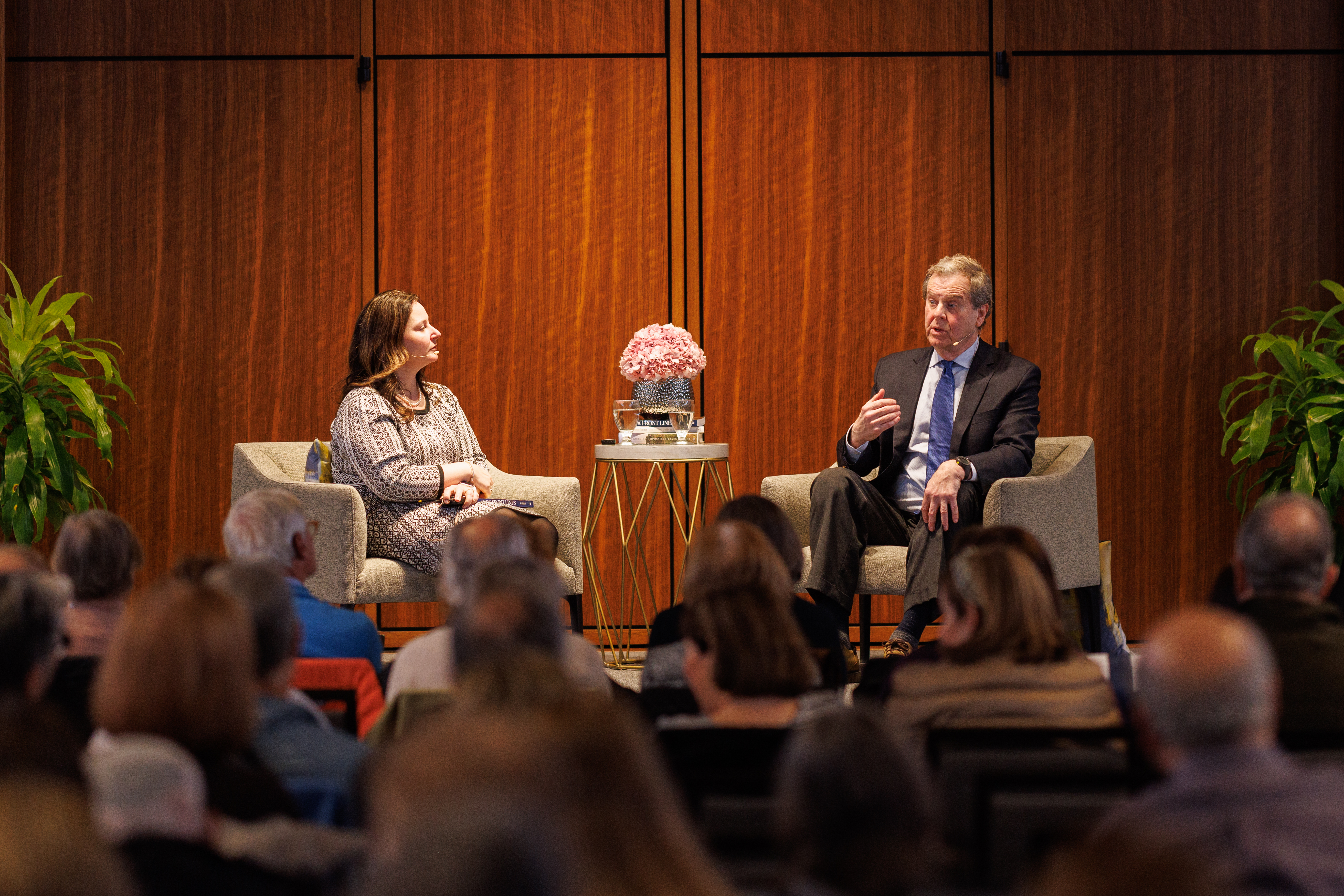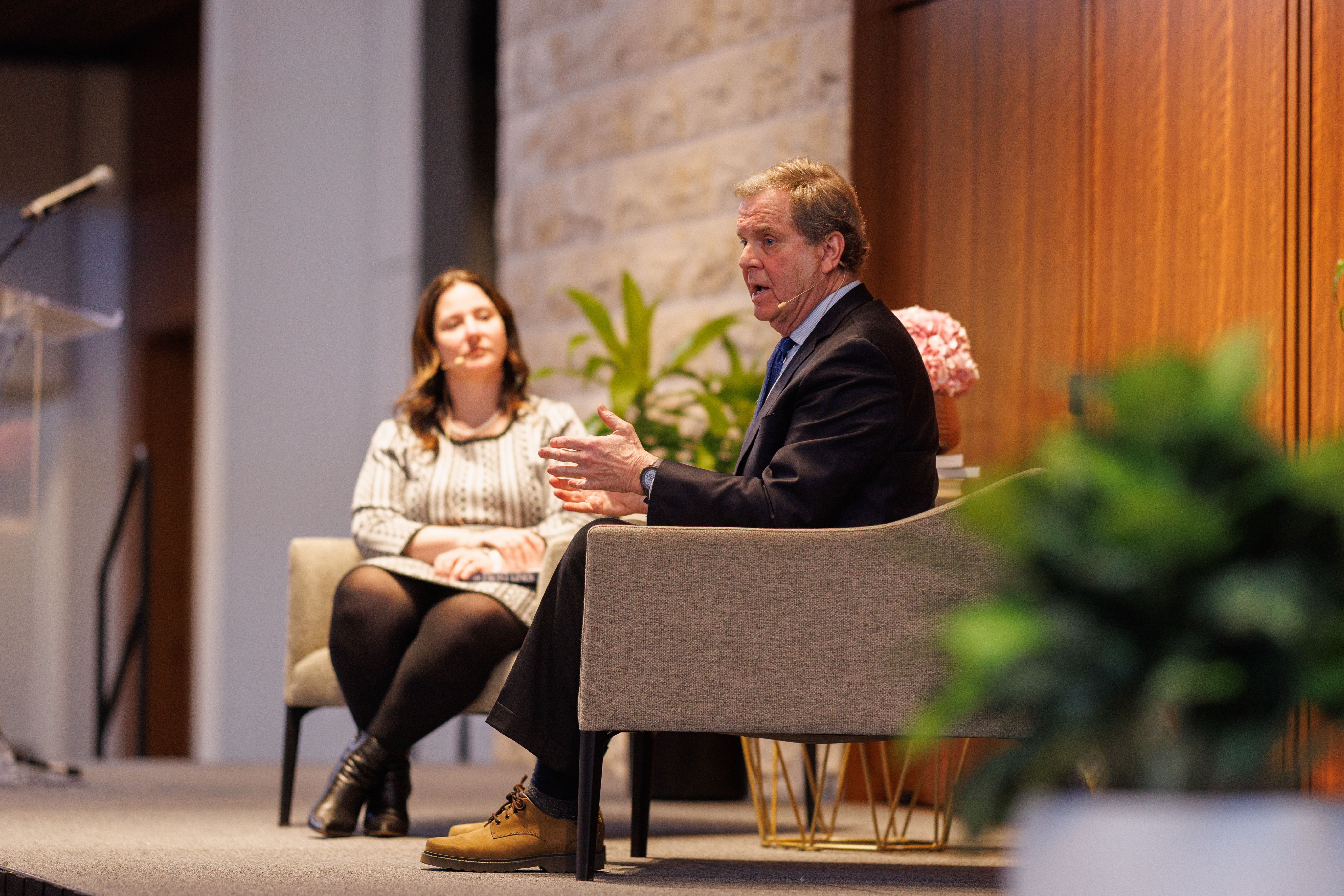Approximately 300 people gathered at The Temple, Congregation B’nai Jehudah on Nov. 21 to hear from longtime Jewish advocate David Harris.
Harris has been active in Jewish advocacy for more than 50 years, having served as CEO of the American Jewish Committee for 32 years and currently serving as executive vice chair of the Institute for the Study of Global Antisemitism and Policy.
The event was spearheaded by community leader Patricia Uhlmann. B’nai Jehudah’s Rabbi Stephanie Kramer facilitated a Q&A with Harris.
After introductions by Uhlmann, Jewish Federation President and CEO Jay Lewis and JCRB|AJC Interim Executive Director Neta Meltzer, Rabbi Kramer began by asking Harris if current events remind him of the 1930s in Germany. In response, Harris warned against attempting to appease extremist ideologies like Iran’s because appeasement did not work against the Nazis. He also expressed concern about “neo-isolationism” and the importance of the United States’ leadership in global affairs and at the United Nations.
“[At the U.N.] Security Council, there's one hand, literally one hand of one delegate who stands between a resolution that could be legally enforceable,” Harris said. “A global arms ban on transfer of weapons to the State of Israel, for example — the one hand is the hand of the United States of America… You and I have no control over when that moment might come. It could come under Joe Biden. It could come under Donald Trump. It could come under another leader, whoever that leader might be, and whoever controls the Congress. They have to be of a mind, courage and principle, who instruct the American delegate who raises that hand.”
Regarding antisemitism and anti-Zionism, he called for a “spinal transplant” for the Jewish community, saying that it must draw from Israel’s resilience to face it with courage and determination.
“Unlike five or 10 years ago, to be a Jew in this country — a proud Jew, a proud Zionist — entails a certain courage and a certain risk,” Harris said. “When we ask our children to stand up at university, do we understand what we’re asking them to do and what the consequences might be? We need to learn from Israel, these sort of superheroes, and not just applaud them, but begin to emulate them.”
He also said the community should be aware of antisemitism on all sides of the political and ideological spectrum.
“I’m swivel-headed and worrying about left-wing antisemitism, right-wing antisemitism, jihadist antisemitism. I would urge all of us, whatever your party affiliations may be, to become not just recipients of spinal transplants, but of swivel-heads,” Harris said.
Politics were also addressed as Rabbi Kramer asked about the conglomeration of American senators proposing an arms ban against Israel. Harris mentioned that politicians against the war in Israel continue to blame Prime Minister Benjamin Netanyahu for the ongoing war.
“What happened on Oct. 7 was not a response to Benjamin Netanhayu,” Harris said. “It was a long, coordinated effort in which Hamas jumped the gun… Whether Yair Lapid or Benny Gantz — or, for that matter, Shimon Peres or Golda Meir — had been prime minister, I, for one, don’t believe for a single moment the calculation [of Hamas] would have changed, because this is not about [Netanyahu]. This is about Israel.”
The topic of rising anti-Israel sentiment in young adults, both Jewish and not, elicited from Harris criticism of certain colleges — both due to them not enacting consequences against antisemitic acts and for the fact that Qatar is a major donor to American universities — and Jewish education itself.
“We have allowed ‘tikkun olam-ism’ to replace Judaism and Zionism as the secular religion of too many American Jews,” Harris said. “...I’m someone who very much believes in our ethical and moral obligations to others, but everything has to be calibrated. When ‘tikkun olam-ism’ in a way displaces or replaces the foundation of Judaism and Zionism, or our whole heritage and tradition gets boiled down to nothing more than ‘do-goodism,’ forgive me, but what distinguishes Jews from Methodists and Quakers and other people who want to do good?”
Harris decried the divisions in the worldwide Jewish community and said that it has resulted in the lack of national Jewish leaders like Rabbi Lord Jonathan Sacks, Elie Wiesel and Natan Sharansky.
“I can tell you who [the national Jewish leaders] are, but they're non-Jews,” he said, naming people such as Rep. Richie Torres, Sen. John Fetterman, former U.N. Ambassador Nikki Haley and former Secretary of State Mike Pompeo. “They're standing up for us, loud, proud, vocal, unflinching, and we're still involved in our own smaller territorial turf issues.”
He added that this event proves that the Kansas City Jewish community is an exception, citing the list of organizations that united to support the event. He also thanked former JCRB|AJC CEO Gavriela Geller for her work during his tenure at AJC; Federation President and CEO Jay Lewis as “one of the leading figures in the Federation world, not just in Kansas City;” and Kansas City and the state of Missouri for Eddie Jacobson and President Harry Truman.
The event was held in partnership with several community organizations and synagogues, including Jewish Federation of Greater Kansas City, The J, Jewish Experiences, Jewish Community Relations Bureau | AJC, Congregation Beth Israel Abraham & Voliner, Congregation Beth Shalom, Congregation Beth Torah, Kehilath Israel Synagogue, New Reform Temple and B’nai Jehudah.

David Harris in conversation with Rabbi Stephanie Kramer at the event “An Urgent Call to Action: In Conversation with David Harris” on Nov. 21.



